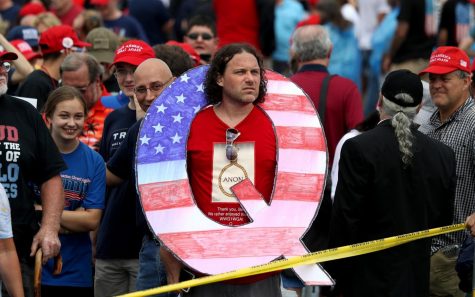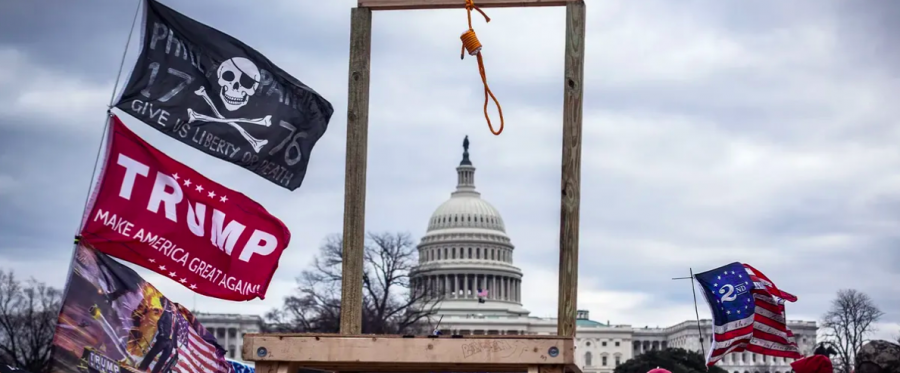Shay Horse/NurPhoto via Getty Images
Politics
On January 6, the nation, indeed the world, watched rioters storming the steps of the Capitol Building, determined to halt the confirmation of Joe Biden into the office of president. A plethora of descriptors surrounds the insurgents — misguided, hateful, QAnon-addled — but sociologists have a new adjective: lonely. Isolation is the alt-right’s greatest recruitment weapon. So how did the wealthiest countries in the world fall victim?
Before the 1970s, President John F Kennedy’s declaration that “a rising tide lifts all boats” was true. There was no significant gap between workers’ wages and their productivity. That changed under President Ronald Reagan’s implementation of neoliberalism, an economic theory that sought to replicate the Gilded Age, a short-lived era of capitalist prosperity that collapsed into the Great Depression. Reagan claimed that the wealth generated by unchecked corporations and monopolies would inevitably “trickle down” to working Americans. In actuality, deregulation widened the productivity-pay gap. Between 1979 and 2020, worker productivity grew 3.5 times faster than workers’ wages. The rest of the difference in revenue went to CEOs and other higher-ups. On the other hand, union membership not only “trickled down” but plummeted. Between 1979 and 1990, unions lost 8.7 percent of their members due to anti-labor policies. Every U.S. president since Reagan furthered neoliberalism, as evidenced by the continued decline of labor union membership. Biden’s infrastructure bill and backing of labor unions represent a break from Reaganomics, but the full scope of that deviation is still unknown, especially when the private sector exerts so much influence. Amazon’s campaign this past April was overwhelmingly effective in preventing unionization. The combination of union crackdowns and relentless labor exploitation stripped workers of solidarity. According to foreign policy writer George Packer, “when towns lost their Main Street drugstores and restaurants to Walgreens and Wendy’s in the mall out on the highway, they also lost their Rotary Club and newspaper…This hollowing-out exposed them to an epidemic of aloneness, physical and psychological.”

Noreena Hertz, the author of The Lonely Century, explored this in her interviews. A locomotive engineer from Tennessee reported, “the harder I work, the less I see, you know, I don’t see myself getting any better off.” He explained that President Obama’s neoliberal policies felt like a betrayal and that the anti-establishment Donald Trump was the only one “telling it like it is.” President Trump uniquely connected with rural citizens during his first campaign, forging cultural deference so intense that returning 2020 supporters didn’t care about his failure to make tangible gains for the working class. In 2016, Trump supporters were lonelier than any other candidate base. 52 percent were civically disengaged, not participating in community activities like sports teams, book clubs, or volunteering organizations, compared to 33 percent of Ted Cruz voters. FiveThirtyEight noted similar trends in 2020. As Hertz puts it, “loneliness and right-wing populism are… close bedfellows.” She’s not the first one to identify this trend. Political scientist Hannah Arendt wrote in 1951 that totalitarianism “bases itself on loneliness, on the experience of not belonging to the world at all,” a theory confirmed by both Trump supporters and domestic terrorists.
CNN reports that “like many previous conspiracy theory groups, QAnon has become as much about community as its actual theory.” Take it from QAnon disciples themselves. An Invitation to the Great Awakening, the manic, seminal text of the movement, devotes an entire chapter to revitalizing communities: “Most people have not even been able to afford themselves a new outfit let alone anything else. So many ways people can band together across our country and make a difference in these little forgotten towns and depleted cities.” The group of believers who authored this book even call themselves WWG1WGA, an acronym for the oft-cited QAnon mantra “Where we go one, we go all.” Through engaging with Q’s baseless claims, lonely people can regain a brotherhood that they would follow to the end of the earth — or to the Capitol‘s doors.
